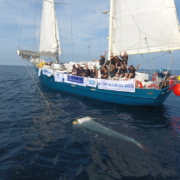24 March 2023
Plastic Soup Foundation, along with other environmental organizations, has worked for years to push for deposits on bottles and cans in the Netherlands. As of April 1, in the Netherlands there will be a deposit not only on large and small PET bottles, but also on cans. Why is this so important to us?
Deposits are the best tool for both a circular economy and less litter. Therefore, it is good to deploy the system for as much packaging as possible. Supermarkets play a crucial role in this. By working with return systems and a different way of packaging, a lot of profit can be made in the fight against disposable plastic. You can already see this development in countries such as France and Germany.
TWO ADVANTAGES OF DEPOSITS
The deposit system has two major advantages. First, it creates much less litter, and therefore less environmental damage and lower cleanup costs. In addition, the system provides clean return streams. For optimal recycling, it is important that the returned packaging not be mixed with other packaging or materials. This can only be achieved with separate return and sorting.
Extending deposits to other packaging therefore offers a huge opportunity: from cookie tins to detergent bottles and much more.
You might also be interested in:
Deposit on plastic bottles: a victory in the fight against the plastic soup!
Deposit on tin can is good decision, but not good enough





